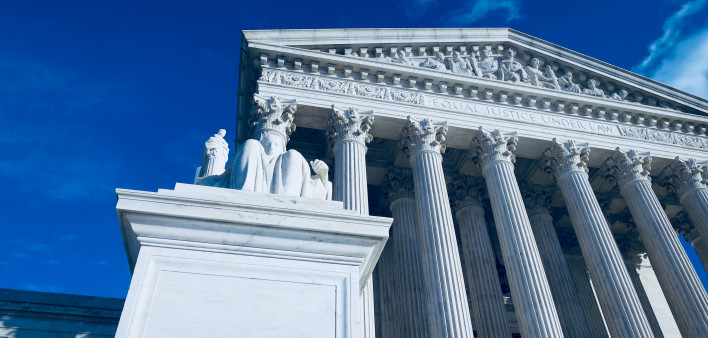The Supreme Court heard arguments Tuesday about the free speech of HIV-related health care organizations—specifically, whether the foreign affiliates of companies based in the United States can be forced to make pledges against sex work and sex trafficking before receive funding to fight HIV/AIDS.
The justices sounded skeptical, reports The Washington Post. This could be in part because the court heard a similar case in 2013 and ruled the United States cannot require health organizations to “pledge allegiance to the government’s policy of eradicating prostitution” in order to receive AIDS funding.
The new case differs from the 2013 case in at least two major ways. First, it involves the affiliates of U.S.-based health care companies, not the health care companies themselves. Second, the makeup of the Supreme Court has changed in the past seven years and is often viewed to be more conservative today.
Perhaps a third difference should be noted: Arguments in the 2020 case, U.S. Agency for International Development v. Alliance for Open Society International, were heard via teleconference, a result of shutdowns related to COVID-19. This week marks the first time in history that arguments were presented remotely. (This also means the arguments are available to the public. You can listen to this case and others on NPR.org.)
In the 2020 case, groups fighting the HIV epidemic globally said that for their work to be successful, they need to be able to reach sex workers; in that regard, forcing companies to make pledges against sex work is counterproductive.
At issue is whether the messages of the foreign affiliate and the U.S. organization are separate. “When CARE in Kenya takes the pledge, its affirmation of belief is attributed to CARE in the United States, thus putting words in the mouth of the U.S. entity,” said David W. Bowker, who represents the health groups, according to the Post.
What’s more, Chief Justice John G. Roberts, who wrote the 2013 opinion, pointed out that in many cases the affiliate and the U.S. company often have the same name, logo and brand.
Justices Samuel A. Alito Jr., Brett M. Kavanaugh and Neil M. Gorsuch expressed disagreement and concern with Roberts’s line of thinking.
As POZ noted in June 2013, the Supreme Court 6–2 decision rebuked the Obama administration and said the pledge violated the First Amendment. Four organizations that conduct AIDS work in Africa, Asia and South America had challenged the so-called Prostitution Pledge included in 2003’s multibillion-dollar President’s Emergency Plan for AIDS Relief (PEPFAR) as well as other programs.
These aren’t the only instances of U.S. HIV funding abroad being criticized for obligating recipients to meet controversial guidelines. For example, soon after Trump became president in 2017, he reinstated and expanded the Mexico City Policy, also known as the global gag rule. It forbids the funding by the United States of any non-U.S.-based health group that performs abortions or provides referrals to, information about or advocacy around abortion. Under the expansion, these restrictions now apply to HIV funding, including PEPFAR. For more details, read “Is the ‘Global Gag Rule’ on Abortion Affecting PEPFAR’s HIV Programs?”
PEPFAR celebrated its 15th anniversary in May 2018. For more about its accomplishments, read “PEPFAR Helps Over 14 Million People Access HIV Treatment” or watch the video above.







Comments
Comments